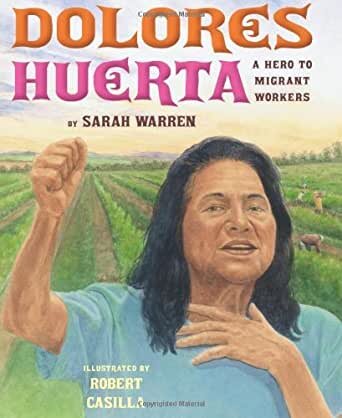
Workers’ Rights
Which Side Are You On?
“Which Side Are You On? tells the story of the classic union song that was written in 1931 by Florence Reece in a rain of bullets. It has been sung by people fighting for their rights all over the world. Florence's husband Sam was a coal miner in Kentucky. Many of the coal mines were owned by big companies, who kept wages low and spent as little money on safety as possible. Miners lived in company houses on company land and were paid in scrip, good only at the company store. The company owned the miners sure as sunrise.
That's why they had to have a union. Miners went on strike until they could get better pay, safer working conditions, and health care. The company hired thugs to attack union organizers like Sam Reece.
George Ella Lyon tells this hair-raising story through the eyes of one of Florence's daughters, a dry-witted, pig-tailed gal whose vantage point is from under the bed with her six brothers and sisters. The thugs' bullets hit the thin doors and windows of the company house and the kids lying low wonder whether they're going to make it out of this alive; wonder exactly if this strike will make their lives better or end them, but their mother keeps scribbling and singing. "We need a song," she tells her kids. That's not at all what they think they need. Graphic novelist Christopher Cardinale brings Florence's triumphant story to life in true rip-roaring union style.”
Dolores Huerta: A Hero of Migrant Workers
“A Jane Addam's Children's Book Award Honor Book for Younger Children
Dolores is a teacher, a mother, and a friend She wants to know why her students are too hungry to listen, why they don t have shoes to wear to school Dolores is a warrior, an organizer, and a peacemaker When she finds out that the farm workers in her community are poorly paid and working under dangerous conditions, she stands up for their rights This is the story of Dolores Huerta and the extraordinary battle she waged to ensure fair and safe work places for migrant workers The powerful text, paired with Robert Casilla’s vibrant watercolor-and-pastel illustrations, brings Dolores s amazing journey to life A timeline, additional reading, articles, websites, and resources for teachers are included.”
Brave Girl: Clara and the Shirtwaist Makers’ Strike of 1909
“This picture book biography about Ukrainian immigrant Clara Lemlich tackles topics like activism and the U.S. garment industry. The art, by Caldecott Honor winner Melissa Sweet, beautifully incorporates stitching and fabric. A bibliography and an author's note on the garment industry are included.
When Clara arrived in America, she couldn't speak English. She didn't know that young women had to go to work, that they traded an education for long hours of labor, that she was expected to grow up fast.
But that didn't stop Clara. She went to night school, spent hours studying English, and helped support her family by sewing in a shirtwaist factory.
Clara never quit, and she never accepted that girls should be treated poorly and paid little. Fed up with the mistreatment of her fellow laborers, Clara led the largest walkout of women workers the country had seen.
From her short time in America, Clara learned that everyone deserved a fair chance. That you had to stand together and fight for what you wanted. And, most importantly, that you could do anything you put your mind to.”
Click, Clack, Moo Cows That Type
“Farmer Brown has a problem. His cows like to type. All day long he hears:
Click, clack, moo.
Click, clack, moo.
Click, clack, moo.
But Farmer Brown’s problems REALLY begin when his cows start leaving him notes! Come join the fun as a bunch of literate cows turn Farmer Brown’s farm upside-down!”
Joelito’s Big Decision
“Every Friday evening 9 year old Joelito goes with his family to MacMann’s for a juicy burger. But this Friday is different. This time, Joelito’s best friend Brandon is standing in a crowd outside the fast food restaurant protesting the low pay his parents earn there. Will Joelito cross the picket line for a tasty burger? Find out in Joelito’s Big Decision (La gran decisión de Joelito), in English & Spanish. “
Cesar: Yes, We Can!
“Born in 1927 in Yuma, Arizona, César Chavez lived the hard-scrabble life of a migrant worker during the Depression. Although his mother wanted him to get an education, César left school after eighth grade to work. He grew to be a charismatic leader and founded the National Farm Workers Association, an organization that fought for basic rights for farm workers. In powerful poems and dramatic stylized illustrations, Carmen T. Bernier-Grand and David Díaz pay tribute to Chavez’s legacy helping migrant workers improve their lives by doing things by themselves for themselves.”
In addition to the titles above, you can browse book lists available at…





